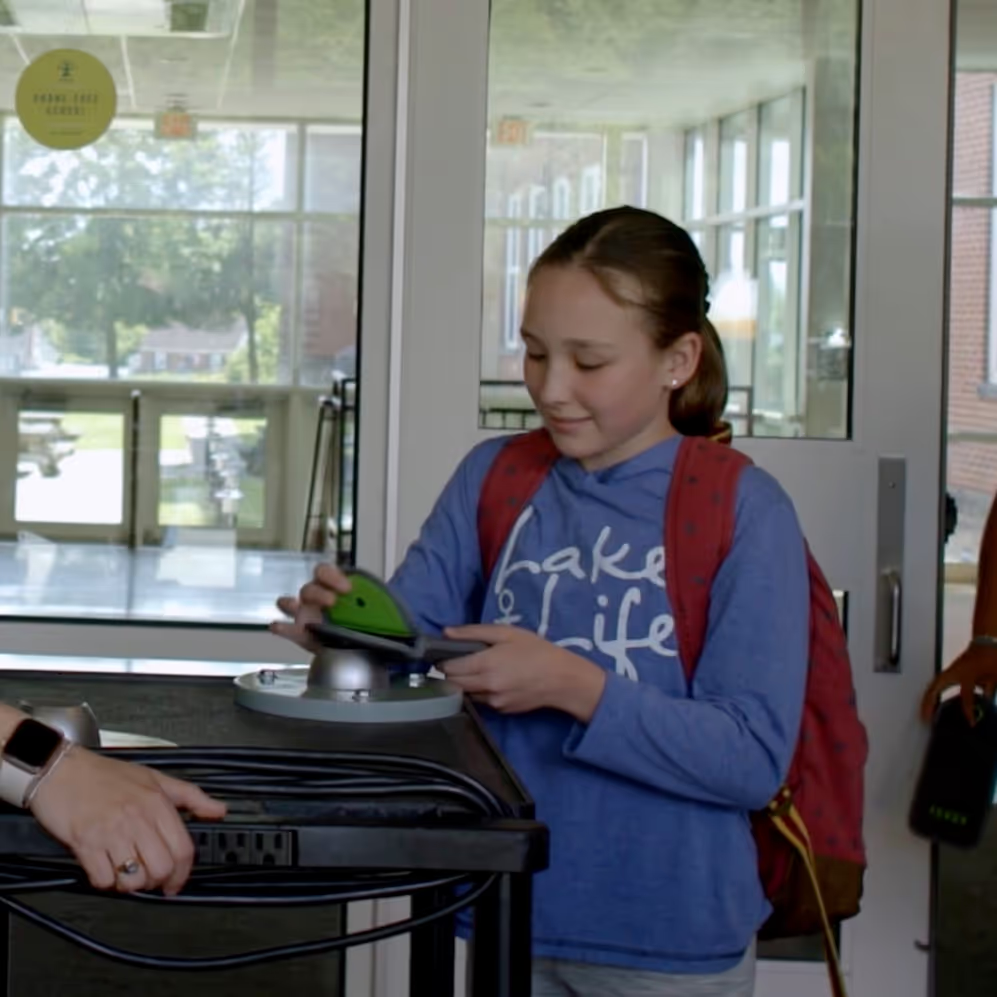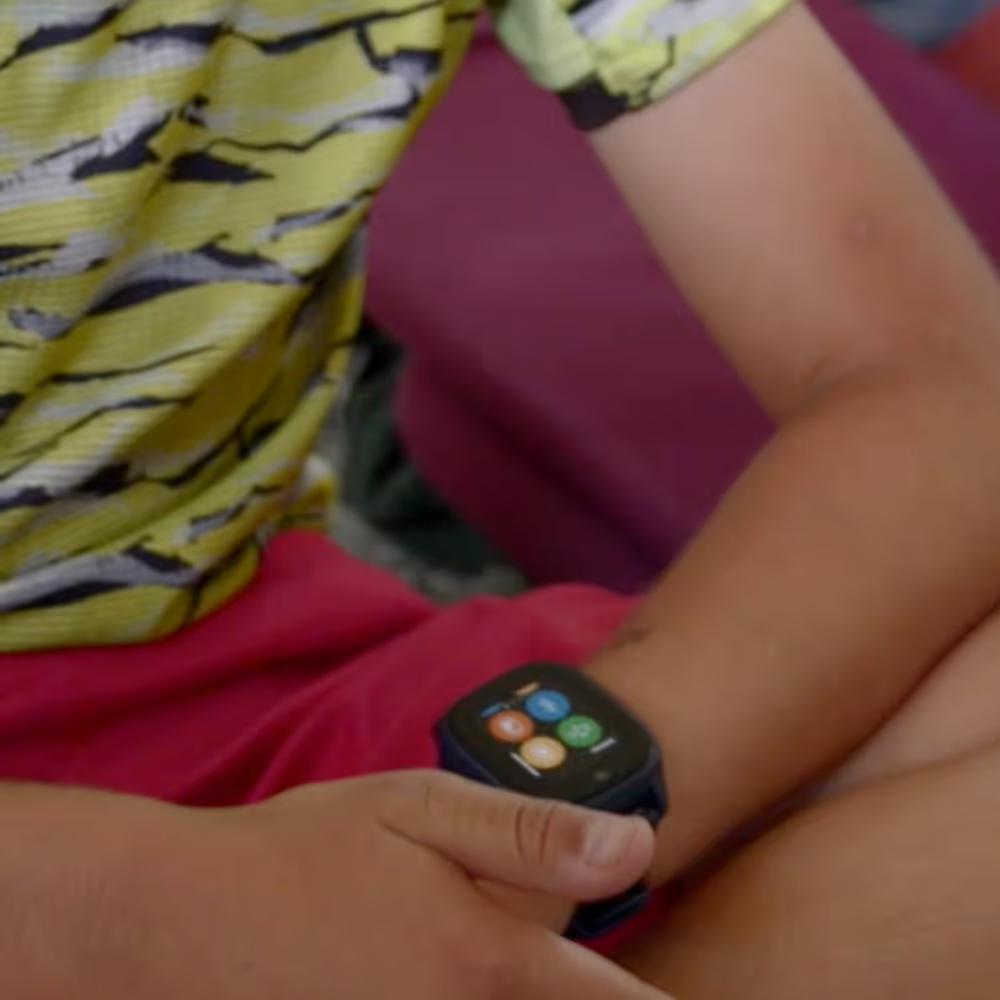


The other day I was interviewing a middle school age boy for the Screenagers Podcast, and we were talking about how school is about to start — and yes, all online for him, as is for most students this fall. I asked if staying off his phone during online class time would be tricky, and no surprise, he gave an emphatic “YES!” He likes to play games on his phone.
I plan to write a series of blogs about back to school during these COVID times. This first one is about cellphones and other handheld devices that students may have next to them while in class over Zoom or the like.
Before I start, though, I want to recognize that there are serious disparities in homes when it comes to students having a computer to use at home-school. A recent study found that 30% of students in the U.S. do not have adequate devices or internet for optimal home learning — this needs to get addressed immediately!
With whatever device a student uses for online school, there is often another tech device that can be a source of temptation and distraction. This is what I want to talk about today, particularly the pull of cellphones when they are by their sides.
Today I give suggestions for bringing up the topic of the pull of cellphones during online class time without igniting defensiveness and debating. This is all about talking about the reality of the pull of phones without getting into specific rules, etc.
#1 Validate them by acknowledging that class time, even before online learning, has loads of boring, frustrating moments, and it makes sense that it is challenging to stay present during those times. Educators are just learning how to engage our kids effectively, but hopefully, they will get better at it and not just lecture and show PowerPoint slides.
#2 Invite your kids to talk about how they would make classes more engaging online. This gets their creative ideas flowing and helps them see things from their teachers’ point of view, which can help build empathy. These are challenging times for everyone involved.
#3 Share the science of how cellphones can impact learning. Many of you know that my team and I created a campaign about cellphones in schools, Away For The Day, based on the science that shows while phones can be helpful tech tools, their negative aspect outweighs the benefits of the tools. Here are a few studies that show this:
In a study titled “The Impact of Mobile Phone Usage on Student Learning,” college students who were not using their cellphones wrote down 62% more information in their notes and scored a letter grade and a half higher on a multiple-choice test than those who actively used their phones.
Another study looked at the effects of interruptions from text messages. To measure this, researchers had college students watch a videotaped lecture and randomly interrupted them with text messages. They created three groups based on the number of texts each one was sent and received. Then they gave each group a recall test measuring the impact of texting on memory. The high-texting group scored significantly worse (10.6% lower) than the low texting interruption group.
Even when youth don’t have their phone on, but just next to them while studying, the device can interrupt their ability to focus. In a study titled “Brain Drain: The Mere Presence of One’s Own Smartphone Reduces Available Cognitive Capacity,” participants performed memory tasks. Some could keep their phone with them, and some had to put it in another room. Those who had their phone did significantly worse. Just the attention and energy it takes not to check a phone seems to cause "brain drain."
#4 Talk about ways phones impact their social and emotional states and how this can impact their learning. When our kids interact with their social feeds, they can get lots of upbeat emotions, but they can also feel negative emotions. How do negative emotions from things like FOMO impede their ability to focus and retain information?
#5 How is it different to have a paper and pencil to doodle, or a quiet fidget toy vs. the intense distraction of social media or a video game?
As I mentioned, I recommend not talking right away about a game plan related to phones and other devices during class time (I have written before about phone use during homework time.) Can you wait a few days and then bring up the issue with them another day? For now, the goal is a more general conversation.
We NOW have a way for people to host online events during this time.
Click here if you are interested in hosting an ONLINE screening for your community.
Click here if you want to attend an ONLINE screening.
Subscribe to our podcast.
August 18, 2020
Learn more about showing our movies in your school or community!
Join Screenagers filmmaker Delaney Ruston MD for our latest Podcast

Learn more about our Screen-Free Sleep campaign at the website!
Our movie made for parents and educators of younger kids
Learn more about showing our movies in your school or community!
Learn more about showing our movies in your school or community!
Join Screenagers filmmaker Delaney Ruston MD for our latest Podcast

Learn more about our Screen-Free Sleep campaign at the website!
Our movie made for parents and educators of younger kids
Join Screenagers filmmaker Delaney Ruston MD for our latest Podcast
As we’re about to celebrate 10 years of Screenagers, we want to hear what’s been most helpful and what you’d like to see next.
Please click here to share your thoughts with us in our community survey. It only takes 5–10 minutes, and everyone who completes it will be entered to win one of five $50 Amazon vouchers.
The other day I was interviewing a middle school age boy for the Screenagers Podcast, and we were talking about how school is about to start — and yes, all online for him, as is for most students this fall. I asked if staying off his phone during online class time would be tricky, and no surprise, he gave an emphatic “YES!” He likes to play games on his phone.
I plan to write a series of blogs about back to school during these COVID times. This first one is about cellphones and other handheld devices that students may have next to them while in class over Zoom or the like.
Before I start, though, I want to recognize that there are serious disparities in homes when it comes to students having a computer to use at home-school. A recent study found that 30% of students in the U.S. do not have adequate devices or internet for optimal home learning — this needs to get addressed immediately!
With whatever device a student uses for online school, there is often another tech device that can be a source of temptation and distraction. This is what I want to talk about today, particularly the pull of cellphones when they are by their sides.
Today I give suggestions for bringing up the topic of the pull of cellphones during online class time without igniting defensiveness and debating. This is all about talking about the reality of the pull of phones without getting into specific rules, etc.
#1 Validate them by acknowledging that class time, even before online learning, has loads of boring, frustrating moments, and it makes sense that it is challenging to stay present during those times. Educators are just learning how to engage our kids effectively, but hopefully, they will get better at it and not just lecture and show PowerPoint slides.
#2 Invite your kids to talk about how they would make classes more engaging online. This gets their creative ideas flowing and helps them see things from their teachers’ point of view, which can help build empathy. These are challenging times for everyone involved.
#3 Share the science of how cellphones can impact learning. Many of you know that my team and I created a campaign about cellphones in schools, Away For The Day, based on the science that shows while phones can be helpful tech tools, their negative aspect outweighs the benefits of the tools. Here are a few studies that show this:
In a study titled “The Impact of Mobile Phone Usage on Student Learning,” college students who were not using their cellphones wrote down 62% more information in their notes and scored a letter grade and a half higher on a multiple-choice test than those who actively used their phones.
Another study looked at the effects of interruptions from text messages. To measure this, researchers had college students watch a videotaped lecture and randomly interrupted them with text messages. They created three groups based on the number of texts each one was sent and received. Then they gave each group a recall test measuring the impact of texting on memory. The high-texting group scored significantly worse (10.6% lower) than the low texting interruption group.
Even when youth don’t have their phone on, but just next to them while studying, the device can interrupt their ability to focus. In a study titled “Brain Drain: The Mere Presence of One’s Own Smartphone Reduces Available Cognitive Capacity,” participants performed memory tasks. Some could keep their phone with them, and some had to put it in another room. Those who had their phone did significantly worse. Just the attention and energy it takes not to check a phone seems to cause "brain drain."
#4 Talk about ways phones impact their social and emotional states and how this can impact their learning. When our kids interact with their social feeds, they can get lots of upbeat emotions, but they can also feel negative emotions. How do negative emotions from things like FOMO impede their ability to focus and retain information?
#5 How is it different to have a paper and pencil to doodle, or a quiet fidget toy vs. the intense distraction of social media or a video game?
As I mentioned, I recommend not talking right away about a game plan related to phones and other devices during class time (I have written before about phone use during homework time.) Can you wait a few days and then bring up the issue with them another day? For now, the goal is a more general conversation.
We NOW have a way for people to host online events during this time.
Click here if you are interested in hosting an ONLINE screening for your community.
Click here if you want to attend an ONLINE screening.
Subscribe to our podcast.
August 18, 2020
Sign up here to receive the weekly Tech Talk Tuesdays newsletter from Screenagers filmmaker Delaney Ruston MD.
We respect your privacy.
The other day I was interviewing a middle school age boy for the Screenagers Podcast, and we were talking about how school is about to start — and yes, all online for him, as is for most students this fall. I asked if staying off his phone during online class time would be tricky, and no surprise, he gave an emphatic “YES!” He likes to play games on his phone.
I plan to write a series of blogs about back to school during these COVID times. This first one is about cellphones and other handheld devices that students may have next to them while in class over Zoom or the like.
Before I start, though, I want to recognize that there are serious disparities in homes when it comes to students having a computer to use at home-school. A recent study found that 30% of students in the U.S. do not have adequate devices or internet for optimal home learning — this needs to get addressed immediately!
With whatever device a student uses for online school, there is often another tech device that can be a source of temptation and distraction. This is what I want to talk about today, particularly the pull of cellphones when they are by their sides.
Today I give suggestions for bringing up the topic of the pull of cellphones during online class time without igniting defensiveness and debating. This is all about talking about the reality of the pull of phones without getting into specific rules, etc.
#1 Validate them by acknowledging that class time, even before online learning, has loads of boring, frustrating moments, and it makes sense that it is challenging to stay present during those times. Educators are just learning how to engage our kids effectively, but hopefully, they will get better at it and not just lecture and show PowerPoint slides.
#2 Invite your kids to talk about how they would make classes more engaging online. This gets their creative ideas flowing and helps them see things from their teachers’ point of view, which can help build empathy. These are challenging times for everyone involved.
#3 Share the science of how cellphones can impact learning. Many of you know that my team and I created a campaign about cellphones in schools, Away For The Day, based on the science that shows while phones can be helpful tech tools, their negative aspect outweighs the benefits of the tools. Here are a few studies that show this:
In a study titled “The Impact of Mobile Phone Usage on Student Learning,” college students who were not using their cellphones wrote down 62% more information in their notes and scored a letter grade and a half higher on a multiple-choice test than those who actively used their phones.
Another study looked at the effects of interruptions from text messages. To measure this, researchers had college students watch a videotaped lecture and randomly interrupted them with text messages. They created three groups based on the number of texts each one was sent and received. Then they gave each group a recall test measuring the impact of texting on memory. The high-texting group scored significantly worse (10.6% lower) than the low texting interruption group.
Even when youth don’t have their phone on, but just next to them while studying, the device can interrupt their ability to focus. In a study titled “Brain Drain: The Mere Presence of One’s Own Smartphone Reduces Available Cognitive Capacity,” participants performed memory tasks. Some could keep their phone with them, and some had to put it in another room. Those who had their phone did significantly worse. Just the attention and energy it takes not to check a phone seems to cause "brain drain."
#4 Talk about ways phones impact their social and emotional states and how this can impact their learning. When our kids interact with their social feeds, they can get lots of upbeat emotions, but they can also feel negative emotions. How do negative emotions from things like FOMO impede their ability to focus and retain information?
#5 How is it different to have a paper and pencil to doodle, or a quiet fidget toy vs. the intense distraction of social media or a video game?
As I mentioned, I recommend not talking right away about a game plan related to phones and other devices during class time (I have written before about phone use during homework time.) Can you wait a few days and then bring up the issue with them another day? For now, the goal is a more general conversation.
We NOW have a way for people to host online events during this time.
Click here if you are interested in hosting an ONLINE screening for your community.
Click here if you want to attend an ONLINE screening.
Subscribe to our podcast.
August 18, 2020

This year, millions of students are experiencing a major shift: school days without phones, smartwatches, or other personal devices. Today we explore the wins, hurdles, and solutions helping schools succeed. We also share our resources that you can use to support technology policy changes in your schools.
READ MORE >
I recently sat down with middle school principal Zach at his school in Washington State. We talked about the challenges Zach and his team faced in his early years as principal when students used phones during school, and how he brought about a powerful transformation by having phones and smartwatches put away in locked pouches for the whole school day. In today’s blog, to raise awareness of the challenges, I share five real examples from Zach of the troubling ways students use phones at school to be unkind.
READ MORE >
It is with great pleasure that I share with you today a piece that Lisa Tabb and I did for Jonathan Haidt's (Author of The Anxious Generation) and researcher Zack Rausch's Substack blog — After Babel. In it, we discuss the rise in use of smartwatches in elementary schools and the problems they pose. There is a real cost to arming (pun intended) our kids with these devices and sending them to school. Now is the time to stop and fully address this topic and ensure that schools become smartwatch and phone-free.
READ MORE >for more like this, DR. DELANEY RUSTON'S NEW BOOK, PARENTING IN THE SCREEN AGE, IS THE DEFINITIVE GUIDE FOR TODAY’S PARENTS. WITH INSIGHTS ON SCREEN TIME FROM RESEARCHERS, INPUT FROM KIDS & TEENS, THIS BOOK IS PACKED WITH SOLUTIONS FOR HOW TO START AND SUSTAIN PRODUCTIVE FAMILY TALKS ABOUT TECHNOLOGY AND IT’S IMPACT ON OUR MENTAL WELLBEING.
